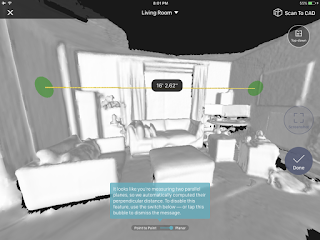Augmented reality startup Occipital first burst on the scene in 2013 with a successful Kickstarter campaign for the Structure Sensor — a strip of cameras and sensors you strap to your iPad that can be used to scan, measure, and project things into the world around you. Today the company is pushing that tech forward by releasing its first iOS app called Canvas. It’s an app that is capable of capturing and processing 3D scans of entire rooms, and it will even let you take accurate measurements inside that scan. Think of it like digital measuring tape, only more powerful.
“One of the examples that we showed in our Kickstarter video back in the day was a person scanning and measuring our entire house,” Occipital cofounder Jeff Powers tells The Verge. While the original Structure Sensor was technically capable of this, Powers says that the dozens of apps developers have made for Structure Sensor using the software development kit have dealt more with small-scale interactions. “Making the jump from object-level things to entire spaces like rooms or homes has proven to be a pretty big leap, especially for a third-party developer to pull off.”
CANVAS MAKES THOUSANDS OF MEASUREMENTS PER SECOND WITH SUB-MILLIMETER ACCURACY
So Occipital went ahead and made the room-scale app themselves. Canvas, Powers says, is “all about letting a consumer or professional digitize a space.” You can use it to create a three-dimensional scan of an entire room, or even your whole home if you want. Canvas will also let you make measurements within that scan, so you could theoretically measure for an entire room’s worth of furniture or construction without ever picking up a measuring tape or a pencil.
The app does this by performing tens of thousands of measurements on your iPad, and it leans on the Structure Sensor’s sub-millimeter accuracy to create this scale 3D model. The scans can even be converted into CAD formats, allowing professionals to separate out layers like walls, windows, and ceilings for more complex redesign projects. (That process involves a mix of algorithms and Occipital employees working with the data, and happens over the course of 48 hours, but the company says the goal is to eventually automate everything.)
Powers says the company has sold about 50,000 Structure Sensors since its debut, and he expects Canvas to be used less by general consumers and more by professionals like contractors or interior designers. But Occipital hopes that Structure Sensor owners will find more casual uses for canvas, like measuring a piece of furniture at a store.
Canvas is available on iOS today for free, and Occipital is also selling a new wide angle lens attachment for the $379 Structure Sensor that will improve the motion tracking for room-scale scans. The lens costs $39 on its own, but Occipital will also sell it in a bundle with the Structure Sensor for $399.
